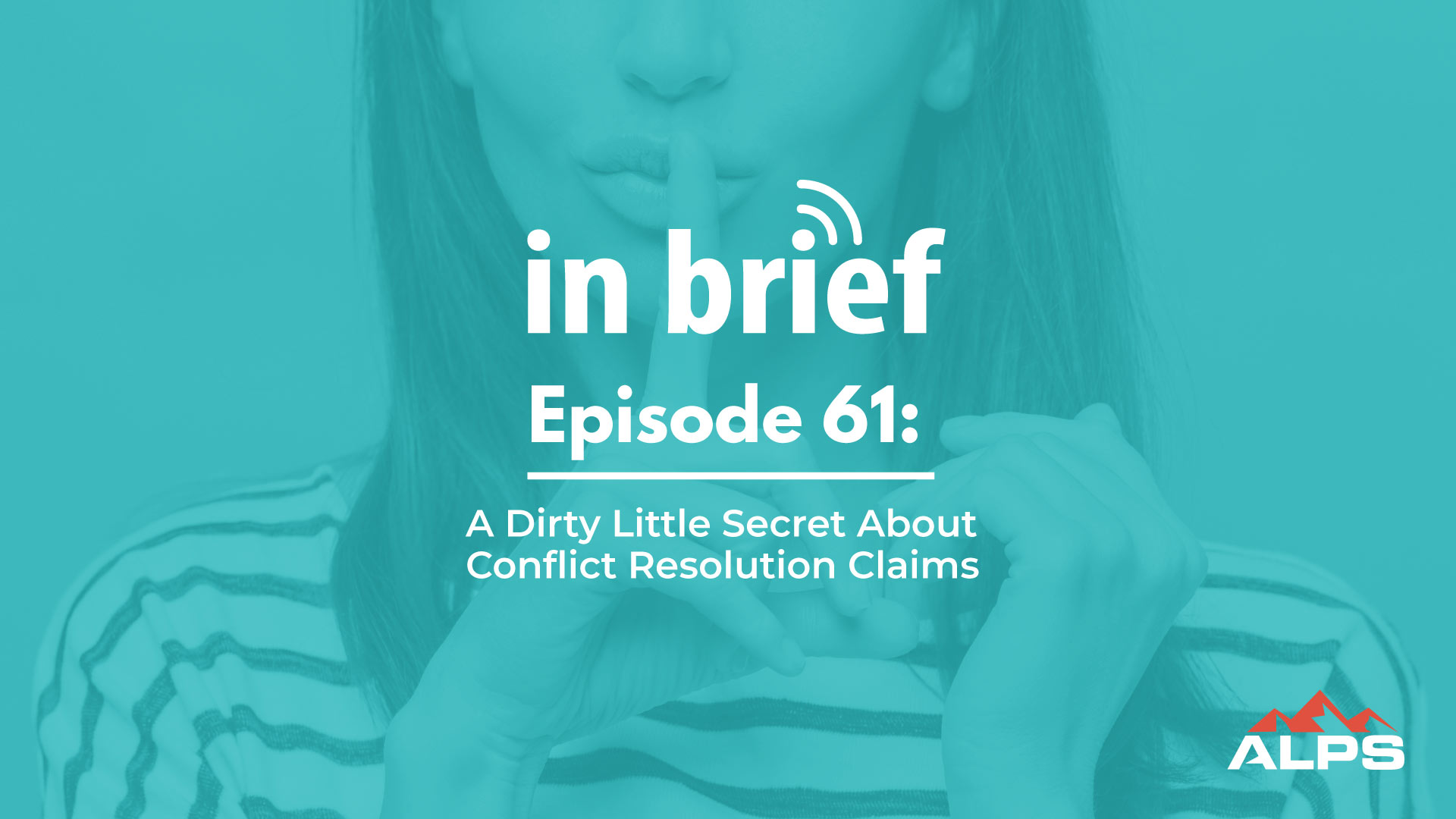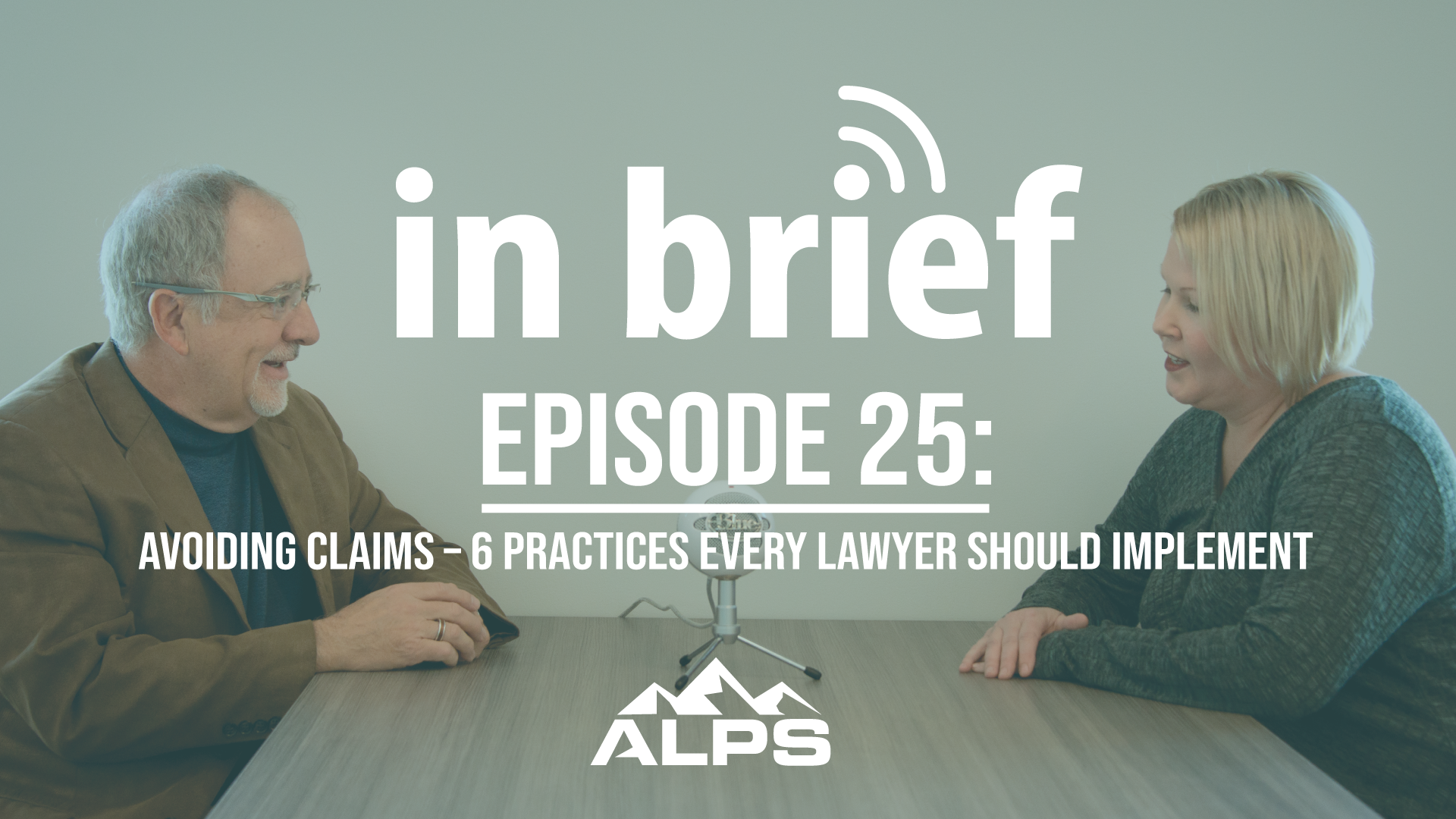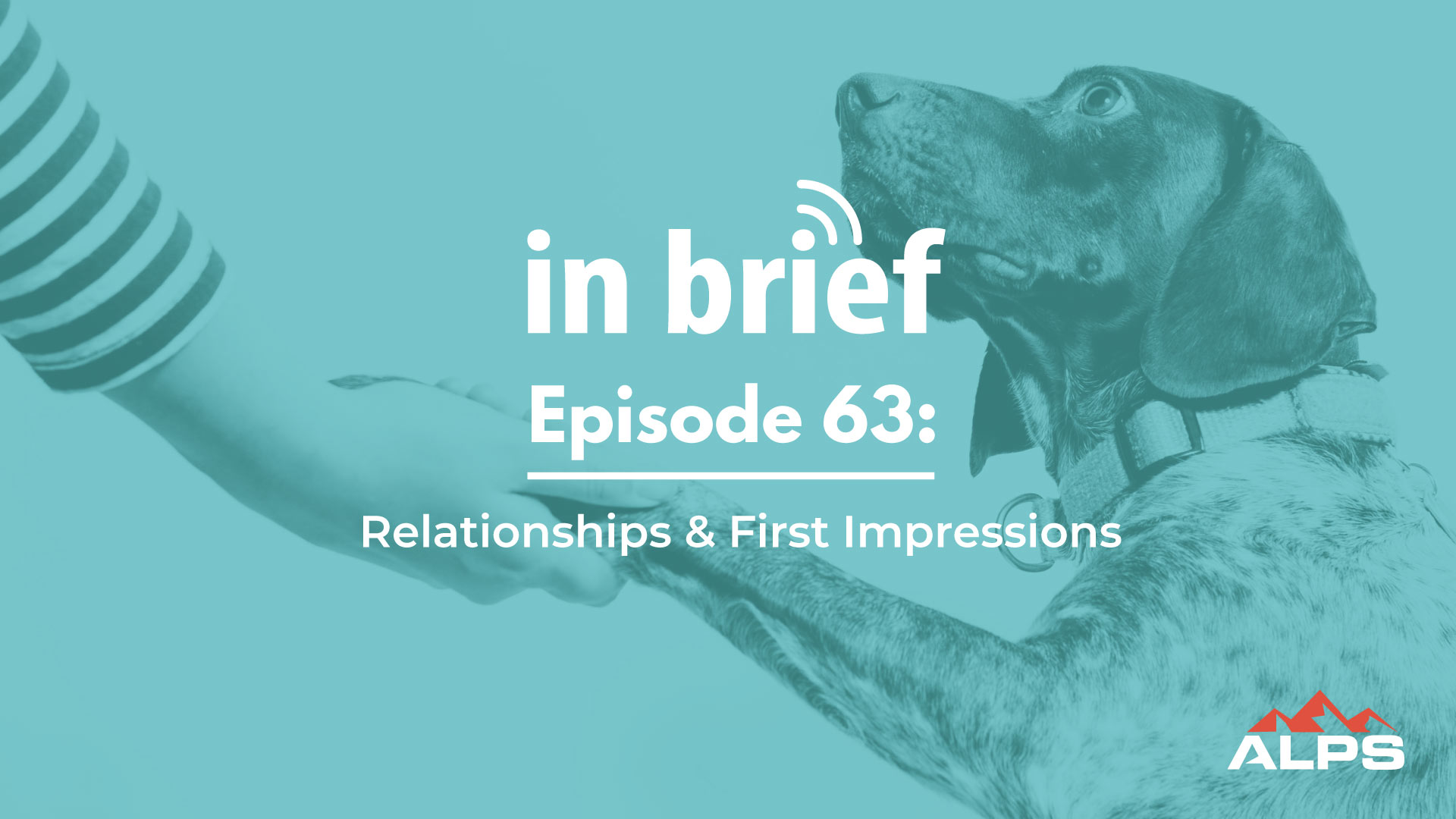15 min read
ALPS In Brief Podcast — Episode 29: Falling in Love with the Cloud
On this special Valentine’s Day episode of ALPS In Brief, Mark sits down with Joshua Lenon, lawyer in residence and data protection officer for Clio
We've crafted solutions tailored to your firm
The world of insurance for law firms can be confusing, and difficult to navigate. We've created this glossary because these common insurance terms should be easy to understand.
8 min read
 Mark Bassingthwaighte, Risk Manager
:
Updated on March 1, 2024 | Posted on December 15, 2021
Mark Bassingthwaighte, Risk Manager
:
Updated on March 1, 2024 | Posted on December 15, 2021

ALPS Risk Manager Mark Bassingthwaighte shares the illuminating story of a law firm, their longstanding wealthy client who couldn’t close the deal on a massive project that would have netted the law firm millions in billables, and the unfortunate circumstances that followed when the firm moved the project forward with a different client to secure the payout.
Transcript:
Mark Bassingthwaighte:
Hello, I’m Mark Bassingthwaighte and welcome to another episode of ALPS In Brief, the podcast that comes to you from the historic Florence building in beautiful downtown Missoula, Montana. I have had a couple of calls of late and they are not out of the ordinary in terms of the topics that are being discussed but it got me to thinking. And I wanted to share a claim story that goes back quite a few years but it’s one of my favorite stories for a number of reasons. A lot of the calls that I take have to do with conflicts of interest and just exploring. Sometimes it’s not clear who the client is and you work through that and you can figure out the conflict issue and resolve some things. Sometimes it’s just a lawyer looking at a matter wanting to stay in or wondering if he or she can even take a case.
So it’s fun and at times just crazy in terms of how complex certain situations can get trying to work through all the issues. But I wanted to share a conflict story again because I’ve had a number of calls. And of late, the issue really has been, what rule are we in? Is it a current client matter in terms of 1.7 or is it a past client situation rule 1.9? And it’s interesting because 1.7 is a bit more restrictive. And 1.9, if we can get there is a little more permissive in terms of allowing attorneys some additional options in terms of whether they can stay in or can take a new matter on, that kind of thing.
So let me get to my story. There’s just some interesting learnings out of it. The gist of it is there’s a larger firm that had a senior partner, I would call this individual rainmaker, and had a very good long-standing client. And this client was a developer. And this developer had an option on a significant amount of land. And the firm wanted to help this individual close the deal. And if they managed to have the client get all this land, the firm stands to make a great deal of money in terms of billables over the years as this project would evolve and be developed. And we are talking about real money here. I mean, it’s way into the seven digits.
So what happened is the client was unable to get sufficient funds together to exercise his option and he lost out. This wasn’t the first deal to go south and probably won’t be the last. And regardless, this individual is an individual of real wealth. The firm, however, looking at how much money could be made if they get involved in this project, didn’t want to walk away. Another partner at the firm had another client who was also an individual of means and was very interested in this project and was able to put the deal together and the firm got involved in terms of all the follow-up work and everybody’s happy, right? Well, not so much. It turns out the project as it went forward with the second client was successful. There was a lot of news coverage, the individual was just getting some attention and whatnot and the original client that lost that on the deal, I guess, got a little put out about all that “just likes, it should have been me” kind of a thing.
So he ended up suing for malpractice based on a conflict of interest. And suffice it to say, at the end of the day, there was a substantial loss paid out. And one little side comment here, a dirty little secret with conflict claims, a law firm or an attorney can’t benefit financially from something they should never have been involved in the first place. So discouragement of fees was also on the table and I assure you that the firm in the situation paid some real money to get out of this claim and finally have it resolved.
So that’s sort of the down and dirty of this claim. But I want to talk about some learnings with it, some interesting things. The first thing I want to talk about is this difference, are we in rule 1.7 or 1.9? Arguably, had this individual, the first developer that lost out on April exercise the option, had this individual been a past client, this may have turned out a little bit differently.
Well, what happened? Why didn’t it play this way? Well, first off, the law firm looking at all this as they wanted to analyze, do a little conflict resolution, if you will, look at this setting and say, well, what’s interesting? We have a bright line. This client was unable to perform on the option and so our involvement here is done. That bright line transitioned this individual from a present client to past client. Now we have all kinds of bright lines here in the practice of law. The deeds had been delivered, the judge signed the final order, the proceeds had been dispersed, the settlement check has been sent out, whatever. There are all kinds of bright lines here. And then the other thing that they started to think through was to say, well, we have some passage of time.
In their case, it was a few weeks. And that passage of time also transitioned someone from a present client to a past client. And that was the rationalization. Well, read the rule in your jurisdiction or the two rules in your jurisdiction. I’ve looked at them in every state and even the model rules, and I’ve never come across any language that says, a bright line or the passage of time is somehow determinative on this issue. It really isn’t. I’ve not come across any ethics opinions that say this. So what does… Well, before I get to what gets us there, I want to talk about this passage of time just a little bit more in-depth too because lawyers will say, okay, in this story, it was a couple of weeks we all agree that was a bad call.
Well, and sometimes, again, money drives ethics. Remember there’s a lot of money on the table and you want to find a way to not walk away from that. But you’ll hear other lawyers say, well, but maybe two years, something like that. What is it? You now say two weeks, two months, two years, five years, 10 years. And there really isn’t an answer to this. I can share over the years in my work here at ALPS, I’ve come across some cases around the country where judges have even said, I don’t know how long it is, but 15 years isn’t long enough. And it’s just like, okay, you got to take note of that.
So the passage of time and these bright lines are not determinative. What is determinative? And it’s interesting. If you talk to juries on the issue, what you hear is, look lawyers, all that you do in terms of your business model, your marketing is to encourage your clients to look at you as, you’re my lawyer, this is my firm, that kind of thing speaking as a client. You want clients to say, we are your clients. Now that’s good business. Hey, there’s nothing wrong with that. But they’ll also say, because that’s the reality, the way you do this, encourage everybody to think, we’re your lawyer, we’re your firm. Unless and until you document otherwise, these individuals are going to be current clients.
So think about that. If we don’t document, if we don’t have… Well, what is the document that gets you there? Obviously a letter of closure. This concludes our representation of you in this matter, that kind of thing. If we don’t have that kind of documentation, I strongly encourage you as you do conflict resolution over the years on this particular issue, that if you don’t have a closure letter, I encourage you to always say, these individuals or clients are perhaps inactive but they are current clients regardless of the passage of time or the bright lines that have transpired, okay? If we don’t have a closure letter clear on its face, this concludes our representation, inactive current client.
I will also tell you that savvy firms in terms of what they do with their conflicts systems, best practices, even after seven years, if a firm may have a far retention policy of seven years, they start shredding things in accordance with the policy and that’s fine but they don’t destroy the closure letter. And I’ll typically maybe a digital copy or something like that, but that’s part of the conflict database. It helps us document, is this a current or a past client? Well, it helps us document it’s a past client. So the continuous use by all in a form of letter closure can be very, very beneficial on this topic. So I want to underscore bright lines; nope, passage of time; nope, documentation is key and a must.
But there’s another really interesting issue here. There is a side learning that I’d also like to toss out. I shared initially that the rainmaker and this first client that lost out on the option have been working together for many, many years. And I want to toss this side learning out because a lot of lawyers do have, whether it’s family, friends, long-term business relationships, but we really develop good relationships with some of our clients. And there is a thinking that just comes into play at times that says, I don’t want to be offensive, I don’t need to document my files as thoroughly, think closure letters then absence of that, because it’s off-putting. I don’t want to say goodbye, get out of here. And really these are good people. I have real faith and trust in the relationship in other words. And based on that faith and trust, these folks just aren’t going to Sue. We go way back and I don’t want to offend. But I got to tell you that’s not accurate.
We need to think about faith and trust in these relationships and what that means from the other side. In this situation, the client basically came to the lawyer in the firm and said, look, I’ve been harmed here to the tune of several million dollars, it’s a lost profit calculation. And I know, again, said this way, but this is what’s driving it based on the faith and trust in this business and personal relationship we’ve developed over the years, I know you would not want me to suffer any harm as a result of your misstep. Would you help bring the claim against yourself and the firm so that I can recover? And would you and your wife like to join us this weekend for dinner? We’re going to take the boat out.
Now, in this situation, actually, I spent about a week with this firm after all this resolved looking and talking about the issues and doing some other education and consulting with them. But literally that conversation occurred and the boat, taking the boat out, we’re not talking about some small, we’re talking about something that’s like 65-foot yard or so. I mean, it’s a big, big boat. There’s a lot of money here. But can you appreciate how in this relationship, faith, and trust really means something different depending on which side of the relationship attorney or client you’re in? So I encourage you also not to minimize this. People that we have as lawyers, great faith and trust in in terms of the attorney-client relationship, this is a population that really is pretty litigious. Every carrier has many, many claims over the years that arise out of these relationships, but still some things go wrong.
So a key takeaway here in this situation too is really just to look and say, Hey, I understand that sending a closure letter out or something may not… I don’t want to offend but it doesn’t have to be a goodbye kiss-off type letter. You’ve been honored consistently over the years by this person or this company or this family continuing to bring work and it’s a real privilege, honor them back and simply say, thank you and write your audience. You need to phrase it and put it in the language it’s typically you and how you would interact with whoever it is, but this concludes my representation. I hope you found my work to be exemplary. It’s always a pleasure. I look forward to working with you on the Jones matter or whenever something new arises. Say hello to your lovely wife and I’ll see you at rotary.
But write your audience, but you really do need that documentation, that closure letter. In this situation, had we had a closure letter, that really could have made a very, very significant difference because we would’ve been in the 1.9 role. Now yes, if you do this analysis on 1.9, we would need to have a consent to our moving forward or this firm should have had consent to move forward and that’s a different topic. But if you think about just the learnings of this fact pattern, I hope you begin to appreciate the importance of documentation and the difference in terms of how we walk through the difference between 1.7 and 1.9.
So that’s my quick little rundown on a conflict issue that’s been topic that we’ve been chatting about with a number of lawyers in recent months here. I hope you found it worthwhile and interesting. I have a little learning here and so it’s been a pleasure. I appreciate your listening. Look forward to being able to share another story, another call at some point down the road. So, Hey, thanks for listening. Stay well all. Bye, bye.
ALPS In Brief Podcast Intro/Outro Music: Walk In The Park by Audionautix is licensed under a Creative Commons Attribution 4.0 license. https://creativecommons.org/licenses/by/4.0/
Artist: http://audionautix.com/
Mark Bassingthwaighte, Esq., serves as Risk Manager at ALPS, a leading provider of insurance and risk management solutions for law firms. Since joining ALPS in 1998, Mark has worked with more than 1200 law firms nationwide, helping attorneys identify vulnerabilities, strengthen firm operations, and reduce professional liability risks. He has presented over 700 continuing legal education (CLE) seminars across the United States and written extensively on the topics of risk management, legal ethics, and cyber security. A trusted voice in the legal community, Mark is a member of the State Bar of Montana and the American Bar Association and holds a J.D. from Drake University Law School. His mission is to help attorneys build safer, more resilient practices in a rapidly evolving legal environment.

15 min read
On this special Valentine’s Day episode of ALPS In Brief, Mark sits down with Joshua Lenon, lawyer in residence and data protection officer for Clio

11 min read
In this episode of the ALPS in Brief podcast, ALPS claims attorney Kobi Gibbs sits down with ALPS Risk Manager Mark Bassingthwaighte to offer...

13 min read
Transcript: Hello, I’m Mark Bassingthwaighte, the risk manager here at ALPS, and welcome to the latest episode of ALPS in Brief, of the podcast...